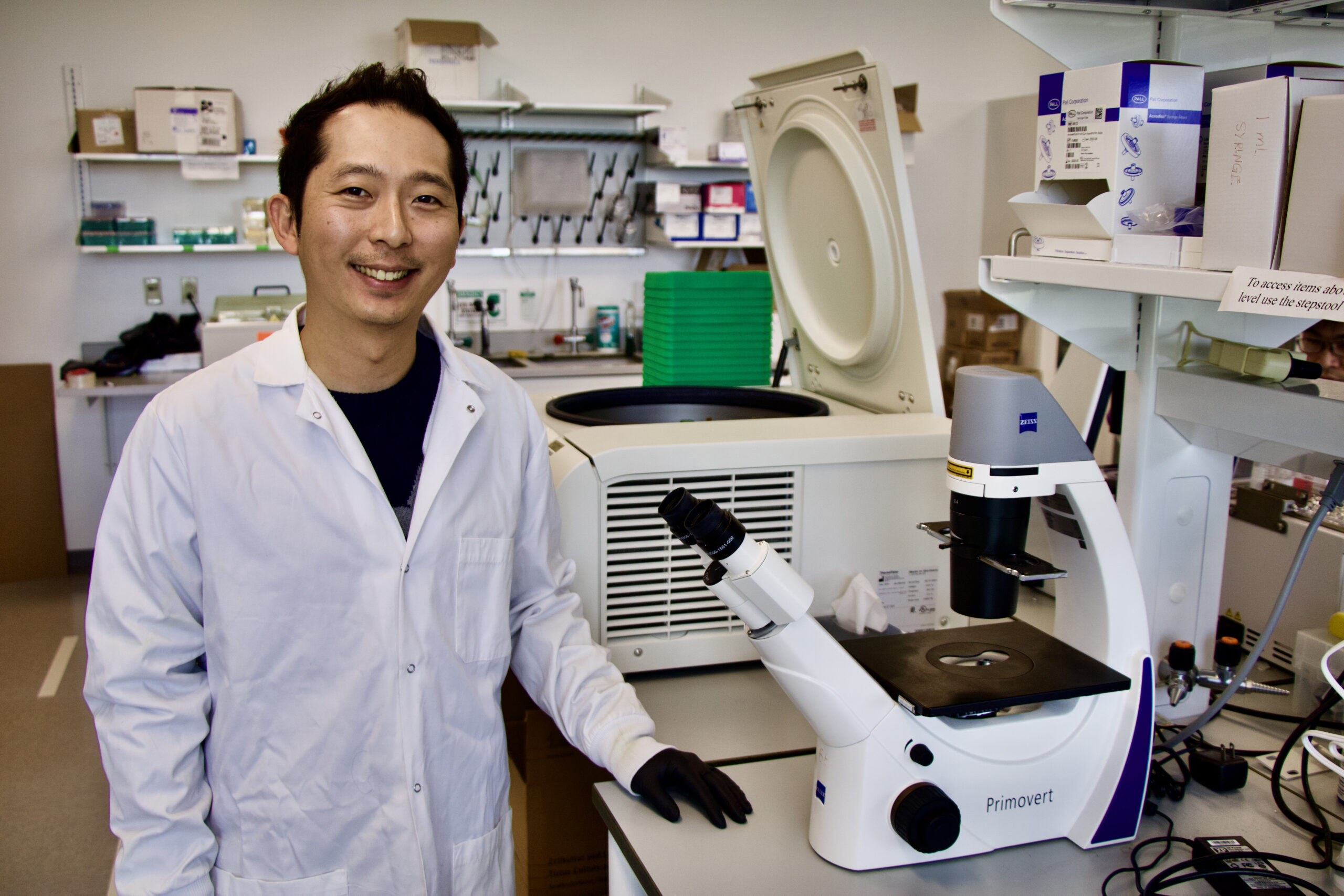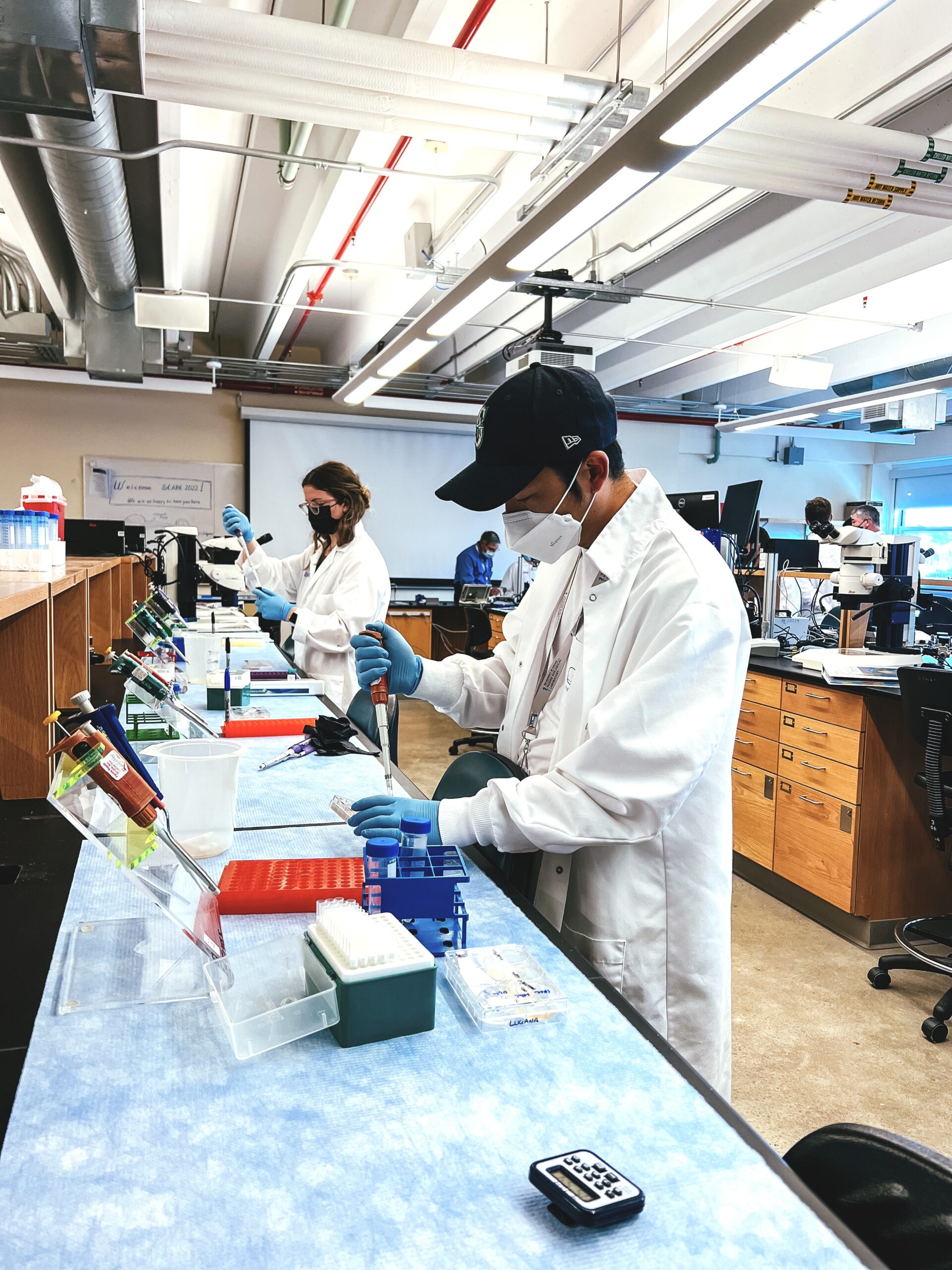Toxicology PhD student cultivating giant leaps in stem cell research

Health sciences PhD candidate Hyunjin Kim has accomplished award-winning stem cell research in the lab of Professor Aaron Bowman.Tim Brouk
Written by: Tim Brouk, tbrouk@purdue.edu
Hyunjin Kim discovered his career calling after taking an immunology course as an undergraduate at Hanyang University in South Korea. The only problem: He discovered his passion for human health one semester before he was to graduate with an international studies degree.
By adding a last-minute major of bioengineering with his almost-completed international studies requirements, it raised eyebrows in his advisor’s office as well as back home in Seoul.
“My parents were not too happy about it,” Kim admitted with a laugh.
Kim — as well as his mother and father — can smile now as that last-minute decision set his career course more than 6,600 miles away to West Lafayette, where he would find a passion in stem cell research in the Purdue University College of Health and Human Sciences. Kim’s undergraduate mentor, Sun-Kyung Lee, is a Purdue alumna. After a stint in a Purdue biochemistry lab, Kim finally found his fit in the lab of Aaron Bowman, professor and head of the School of Health Sciences.
So far, Kim’s Purdue career has yielded multiple research papers, off-campus success and a desire to propel stem cell research field. Much of this work concentrates on gene-environment interaction in neurological disorders research, especially manganese effects on the glutamate neurotransmitter in the human brain. The chemical reaction of too much manganese in the human system could lead to Parkinson’s-like symptoms or Alzheimer’s complications, the research hypothesizes.
‘Too much of a good thing’
The human body needs manganese, which is atypical in most toxicology studies. Lead, for example, has no need in the body. Manganese, however, assists in our abilities to form connective tissue, regulate blood sugar, and maintain healthy brain and nerve function.
But chronic manganese exposure can cause a host of mental and physical problems to go along with the believed pathways to diseases like Parkinson’s and Alzheimer’s. Often, people with too much manganese consume it without their knowledge in tainted drinking water or on the job where metal work, such as welding, occurs. The manganese is inhaled in factories by the welders or other nearby workers.
“Manganese is unique in the sense that it’s an essential nutrient but at the same time, too much of a good thing is bad,” Kim said. “Until recently, it’s only been associated with Parkinson’s, but now, there is accumulating evidence suggesting its involvement in Alzheimer’s.”
Kim has used single-cell RNA sequencing — high-resolution examination of cell genomes at single-cell resolution — to interrogate different gene expressions in response to chronic manganese exposure, which consists of 40-50-day manganese bombardments on the cells. Following the cessation of exposure, Kim would check changes in morphology, gene expression and functions of these stem cell-derived brain cells. The cells came from patients with Alzheimer’s and healthy individuals for comparisons.
A worthwhile trip to Massachusetts

Kim conducts some bench science at the Marine Biological Laboratory in Massachusetts. The student attended a week-long, intensive conference there in 2022.
In summer 2022, Kim was one of 14 graduate students from around the world who had the opportunity to learn, get hands-on research experience, and network with top stem cell and regenerative medicine researchers from around the country for an intensive one-week conference via the University of Chicago’s Frontiers in Stem Cells and Regeneration program. Held at the Marine Biological Laboratory (MBL) in Woods Hole, Massachusetts, there were about triple the number of stem cell researchers to students. Kim’s work was met with positive reactions, leading to a best research poster award late in the week.
“It was real intense. Our days would start at 8 a.m. and go until 9 p.m., around the clock,” Kim recalled. “We got all the attention and were able to ask all of these questions. We were able to work with model systems and do experiments that we just read about only in textbooks — how to generate stem cells, develop them into different cells of the body, and how they can be used in translational medicine to promote human health.”
‘Hungers for new knowledge’
Kim has been an integral part of Bowman’s lab since 2019. Bowman marveled at his graduate student’s passion for the work.
“Hyunjin hungers for new knowledge. This hunger, along with his tenacity, has enabled him to get unique experiences in his graduate education,” Bowman stated. “Hyunjin is a highly rigorous scientist and considers multifaceted aspects of his experimental designs with an eye to quality.”
Bowman revealed Kim implemented new techniques that are now standard in the laboratory.
“Hyunjin has worked out approaches to help us identify individual cells to their corresponding identity in the human brain. He has discovered that at least some individuals with genetic vulnerability to Alzheimer’s disease show increased sensitivity to the brain effects of a metal that itself may increase risk for Alzheimer’s,” Bowman explained. “His advances in research come from his remarkable attention to detail and comprehensive analysis of the scientific literature.”
Pushing the possibilities of stem cells
While it took a couple extra steps, Kim’s career decisions could culminate in giant leaps in stem cell research. Kim said he will pursue a postdoctoral position after his PhD studies, and he is looking forward to a career in exploring the benefits of what stem cells can do for human health.
“I’m doing stuff that I actually enjoy,” Kim summarized. “I want to be the best when it comes to utilizing stem cells for modeling neurodegenerative disorders like Alzheimer’s disease. Using that, I can start answering my own research questions in toxicology as well.”